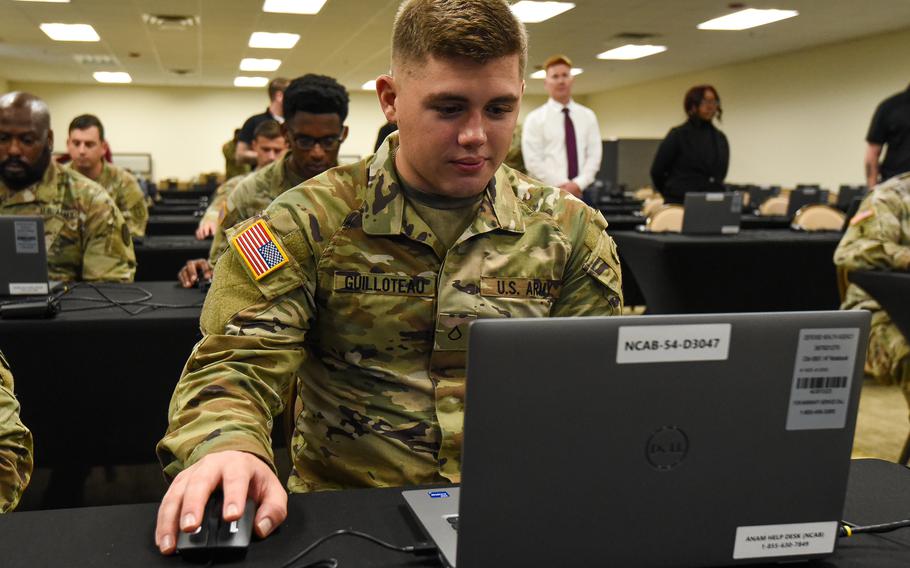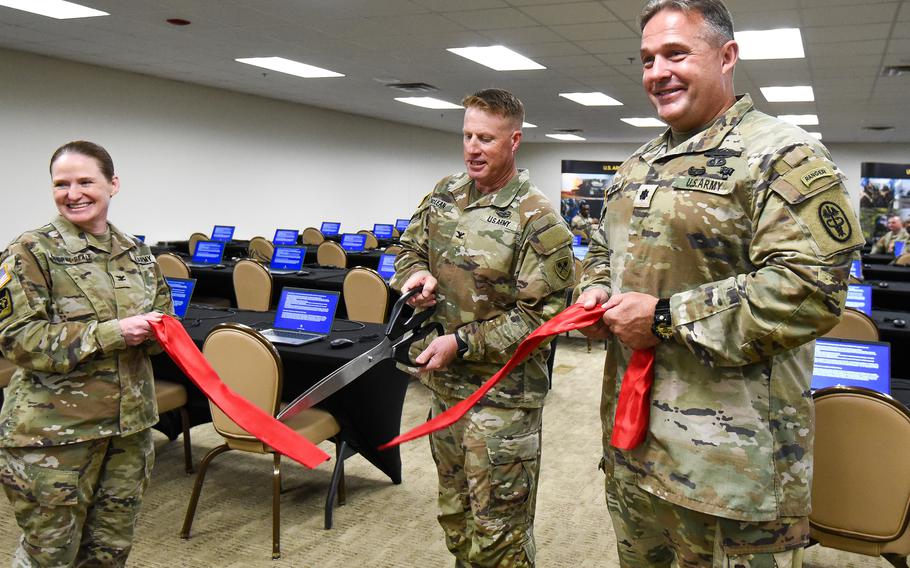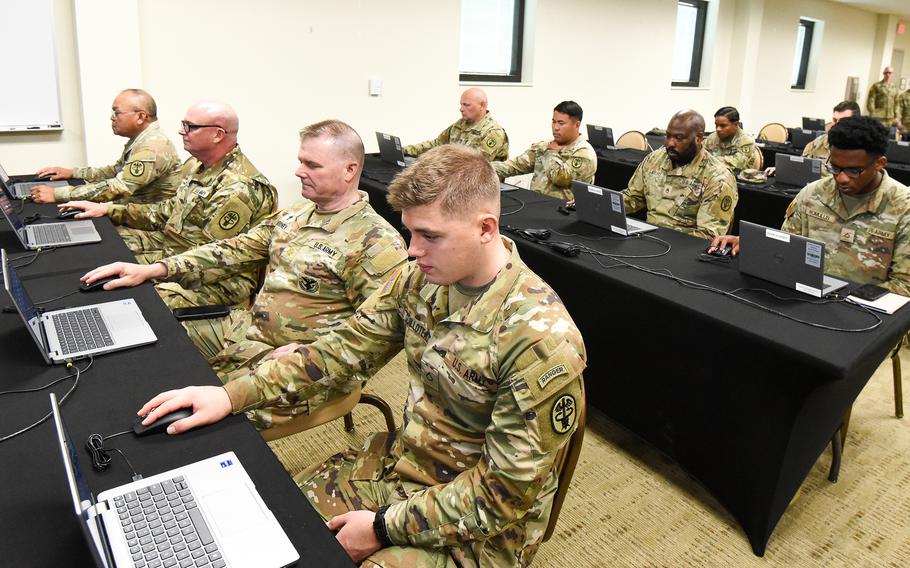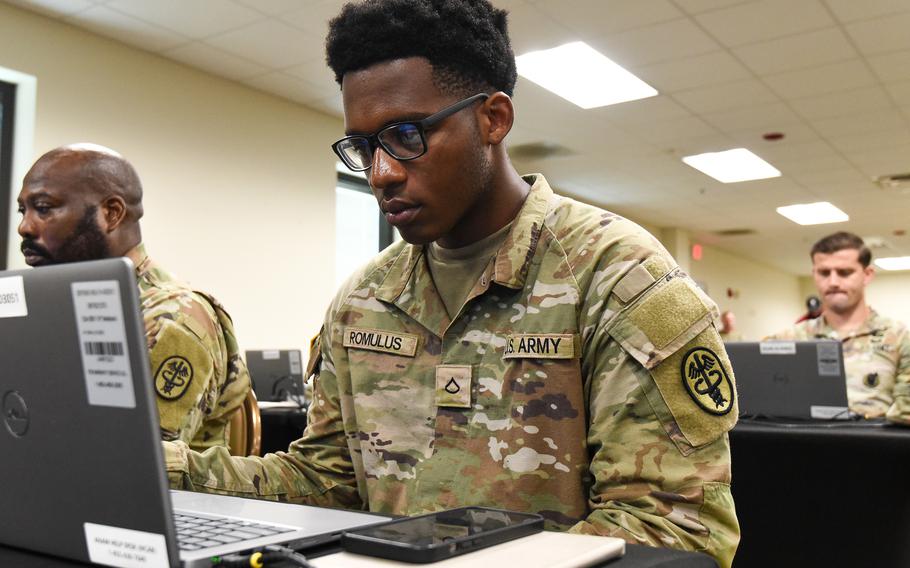
Soldiers at Fort Moore, Ga., take a cognitive screening test as part of a new Army program aimed at improving brain health and recovery. The program will test all incoming recruits and officer trainees across the service for baseline brain health and assess them continually throughout their careers for signs of injury or cognitive decline. (Corey Dickstein/Stars and Stripes)
FORT MOORE, Ga. — The testing is simple: It requires only a computer and a mouse with two buttons — labeled “1” and “2” — but Pentagon officials believe it will have a huge impact on the military’s ability to monitor the brain health of its troops.
Through a series of testing modules, soldiers are instructed to press button “1” as quickly as possible when a star or an “X” appears on their screen, press one of the buttons when a simple math equation is higher or lower than 5, and match symbols on dominoes displayed on the computer screen. The testing, which takes about 30 minutes, is meant to capture the soldiers’ cognitive performance at that moment in time, said Steven Porter, the chief of the neurocognitive branch for the Pentagon’s Surgeon General’s Office and Defense Health Agency.
“Collecting baselines is very important because everyone’s brain functions differently, so using normative data typically is not as helpful for assessing cognitive change without that baseline,” Porter said Monday at Fort Moore where officials gathered to roll out the new cognitive testing program for all recruits coming into basic training at the Georgia Army post. “Being able to get that baseline prior to any significant injury allows us to identify the small cognitive changes that may be occurring that maybe would not have been to the point of diagnosis or even symptomology, so we can identify those changes even before the soldier notices any change within their own cognitive abilities.”
Only milliseconds of change in a soldier’s reaction time to stars appearing on the computer screen during the test can show health care officials that the individual needs assessment for a cognitive change, Porter said. The testing can also help those medical officials to understand where an issue or injury might have occurred in a soldier’s brain, he said.
Fort Moore on Monday became the second Army basic training site to stand up its new baseline cognitive testing program for all incoming recruits, said Col. Jama VanHorne-Sealy, Army Medical Command’s occupational health director. The Army opened testing last month at Fort Sill, Okla. It plans to begin testing at its final two basic training locations, Fort Leonard Wood, Mo., and Fort Jackson, S.C., by the end of September, she said.

Army Col. Greg McLean, center, the commander of Fort Moore’s 196th Armor Brigade, cuts a ribbon to open a new cognitive monitoring program for incoming recruits at the Georgia Army post, as Col. Jama VanHorne-Sealy, left, the Army’s occupational health director, and Lt. Col. John Suprynowicz, the Fort Moore Soldier Recovery Unit battalion commander, look on. (Corey Dickstein/Stars and Stripes)
Army ROTC juniors and seniors underwent the baseline brain health testing in June during annual summer training for ROTC cadets at Fort Knox in Kentucky, VanHorne-Sealy said. By the end of the year, the service aims to open testing for all officer trainees, including for cadets at the U.S. Military Academy at West Point, N.Y., she said.
The new testing is a marked shift in how the service monitors its troops’ cognitive health, VanHorne-Sealy said.
“We are now looking across the brain health of the soldiers throughout their entire career,” she said. “We are baselining them as soon as they enter the service, and then they’re going to get periodic exams over their career based upon whatever occupation they have.”
Soldiers serving in direct combat arms fields such as the infantry, armor, artillery, combat engineering and special operations, will likely be tested every year. Others in jobs where they are rarely exposed to weapons or blasts will typically be tested every three years, VanHorne-Sealy said.
The effort extends beyond the Army, Porter said, as the Pentagon aims to soon test all its incoming troops across the military branches.

Soldiers at Fort Moore, Ga., take a cognitive screening test as part of a new Army program aimed at improving brain health and recovery. (Corey Dickstein/Stars and Stripes)
New program, old test
While the program to provide baseline testing to all incoming troops is new, cognitive testing has been available in the Army since 2007, Porter said. For years, the service reserved those tests for soldiers preparing to deploy into combat and for those suspected of receiving a brain injury.
The change toward testing all incoming service members is a critical one, said Porter, who has spent more than 20 years studying brain injury as an active-duty Navy neuropsychologist and as a Defense Health Agency civilian. The new proactive approach is based on the latest scientific research on blast exposure.
“Injuries that had been sustained at wartime, the [improvised explosive device] blasts, all of these exposures have given us … data that we didn’t have previously, and now we’re able to … be proactive,” said Porter, who helped develop the testing modules. “We just didn’t have the science [before] that we now have today.”
The change will allow the military to catch cognitive issues in its troops quicker to give them a better chance at recovery, and it will also allow the Pentagon to study brain health trends it sees among its 1.3 million service members, he said.
The testing will also not disqualify anyone from serving in the military, VanHorne-Sealy said. Soldiers or recruits cannot fail it.
And it is not meant to assess troops’ intelligence nor will it be compared to the results of other individuals, VanHorne-Sealy said. Soldier’s results will be kept confidential, per medical law.
She likened the test to a hearing screening.
“How has your hearing changed over the last year? Then we need to refer you to somebody to see if there’s an underlying cause, to get an actual medical exam,” Van-Horne-Sealy said. “So, this is really that [cognitive] screening process to determine who we need to send for a better medical evaluation.”
The testing is only useful in comparing results to an individual’s prior results, officials said.
In many cases, a soldier’s cognitive function will return to the baseline with some rest away from blast exposures, Porter said.
“If we identify [an issue] before any symptoms are evident … we can intervene, pull them out of an area with continued blast exposure and let them recover,” he said. “They take a knee for a short period, get back to baseline, and we get them back in the fight.”

Soldiers at Fort Moore, Ga., take a cognitive screening test as part of a new Army program aimed at improving brain health and recovery. The program will test all incoming recruits and officer trainees across the service for baseline brain health and assess them continually throughout their careers for signs of injury or cognitive decline. (Corey Dickstein/Stars and Stripes)
Day zero testing
At Fort Moore, new recruits began taking the test last week. From now on, incoming recruits will take the cognitive test within days of arriving at the Army’s home of infantry and armor training and before they ever set foot in the field or are exposed to a service weapon.
Col. Greg McLean, who commands Fort Moore’s 194th Armored Brigade, which will oversee the cognitive testing program, said it was important the baseline testing is done before recruits enter the field — around “Day zero” or when they arrive on post.
“That way it’s a true baseline, instead of having them come test at some point when they’ve already possibly done something in the Army, where they’ve dealt with some blast exposure,” he said.
The Army’s other basic training locations will also aim to test recruits almost as soon as they arrive on post.
The colonel said he was pleased to see the Army moving to take a proactive response to brain injuries. The 26-year veteran suffered a traumatic brain injury in an explosion in Iraq in 2008 and experienced the Army’s cognitive testing at that time.
“This test was very hard to complete at that time to be able to prove to the Army I could get back to training,” McLean said of his initial cognitive testing in Baghdad not long after his injury. “I think it would be easier today.”
While the cognitive testing in 2008 showed Army medical officials that McLean had improved from his injury, it could not show them if he suffered permanent damage or change.
“So, it’s great now to have the baseline,” he said. “It’s phenomenal that our character of medical care is continually updated [in the Army]. Now each and every citizen as they come in is going to have that baseline. That’s part of the handshake we have with America that we’re going to take care of … our soldiers.”